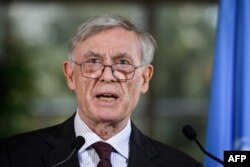The U.N. Security Council approved a resolution Tuesday welcoming "new momentum" from the restart of talks on resolving the decades-old dispute over the mineral-rich Western Sahara, but Morocco and the pro-independence Polisario Front remain deeply at odds over its future.
South Africa and Russia abstained in the 13-0 vote, calling the U.S.-drafted resolution unbalanced.
Last year, the council called for accelerated efforts to reach a solution to the more than four-decade dispute over the territory. But two rounds of talks in December and March, brokered by Secretary-General Antonio Guterres' personal envoy, Horst Kohler, made no headway.
Kohler, a former German president, cautioned after the March meeting that "many positions are still fundamentally diverging" and that nobody should expect "a quick outcome." He said a third round of talks would be held but no date has been set.
Morocco annexed the former Spanish colony in 1975 and fought the Polisario Front until the United Nations brokered a cease-fire in 1991 and set up a peacekeeping mission to monitor it and facilitate a referendum on Western Sahara's future, which has never taken place.
Morocco has proposed wide-ranging autonomy for Western Sahara. But the Polisario Front insists the local population, which it estimates at 350,000 to 500,000, has the right to a referendum.
The resolution adopted Tuesday extended the mandate of the U.N. mission known as MINURSO, which has a 235-strong military contingent, for six months until Oct. 31.
While welcoming "the new momentum" created by the talks, the Security Council also encouraged the parties "to demonstrate further political will towards a solution." The resolution also "emphasizes the need to achieve a realistic, practicable and enduring political solution to the question of Western Sahara based on compromise."
No compromise
But there was no sign of compromise from either Morocco or the Polisario Front.
Moroccan Ambassador Omar Hilale said his country is offering the Polisario Front a chance to govern Western Sahara "within the framework of the larger autonomy that it's offering," including control of its executive, legislative and judiciary bodies and "exploiting natural resources 100 percent within the Sahara for the development of the Sahara."
"The Polisario is still with the mind of the '70s," he said after the vote. "They should change their hard word. They should change their vision for the solution. Otherwise they will spend the coming generation" seeking "independence that will never come."
The Polisario Front's U.N. representative, Sidi Omar, said that "for us, the referendum is our position," because a decision on Western Sahara's future "must be validated by the people of Western Sahara to determine their status." He noted that in the early 1990s, Morocco was in favor of a referendum.
"The major stumbling block in all of this is that Morocco has not shown any sign of wanting to engage in a serious process of negotiations," Omar said. "We don't think if things continue as the way they are that we will go anywhere."









